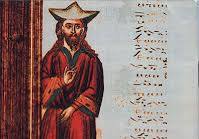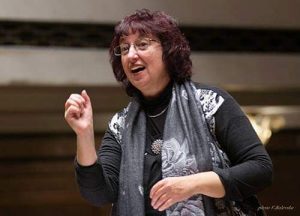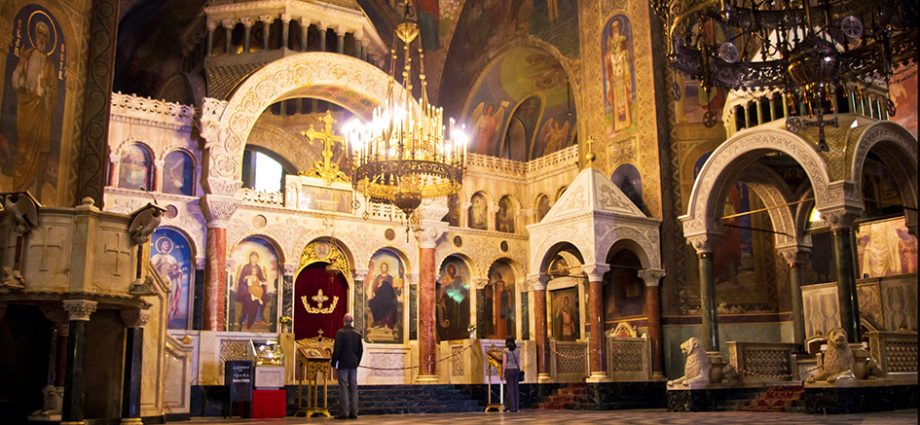Theodora Pavlovitch, Conductor and Professor, Bulgaria
The Bulgarian State was established in AD681 and an event of great importance for the young state was the adoption of Christianity in 865. In the field of music, between Bulgaria and Byzantium in particular, there were bilateral relations that influenced in both directions, maintained by the Athos monasteries. Strongly related to the Empire’s tradition, Bulgarian religious singing in the 9-11th century was marked by all the characteristics of the Byzantian style. In turn, old Slav-Bulgarian folk music influenced the Byzantian chant repertoire. At the same time, two remarkable characters brought a change to European history. The brothers Cyrill and Methodius, monks and missionaries, invented the Slavonic alphabet and translated the main religious books from Greek into the spoken old Slavonic language that is even now in use for the liturgy in most Orthodox countries.

A remarkable personality appeared at the end of the 13th century – Yoan Koukouzeles (1280?-1360) – also known as Yoannis Koukouzelis or John Joukouzeles. Bulgarian on his mother side, he lived in a time of cultural cooperation between the Balkan Orthodox states. His contribution to Orthodox music is considerable: he devised a new neumatic notation, introduced modulation as a system of music, composed a number of liturgical pieces, among them “Polyeleos of Bulgarian Woman”, dedicated to his mother. “Being a product of Bulgarian-Byzantine symbiosis, Yoan Koukouzeles was at the same time one of its most brilliant symbols. The musical heritage of Yoan Koukouzeles is part of the Byzatine civilization, but at the same time it is part of the Bulgarian contribution to the creation, development and dissemination of this phenomenon.” (Dr.Ph. Ivan Bozhilov).
Hundreds of Koukouzeles’ works have survived to this day and his music is still being performed in Bulgarian churches and by some choirs.
At the end of the 14th century the Turkish armies attacked Bulgarian territories and in 1396 the country was completely taken under Ottoman domination. The subsequent almost 500 years of history caused terrible damage to Bulgarian culture. The Bulgarians were forced to change their religion and to turn to Moslemism. Thousands of people were killed until the Ottoman rulers realized that Bulgarians preferred to die rather than lose their Christian faith. Already at the beginning of the Ottoman domination, many people departed from Bulgaria and, as a result, the Bulgarian Orthodox chants were spread to many different places. One of the most important consequences of that movement was the so-called Bolgarskii rozpev (Bulgarian chant) in Russia, Ukraine and Moldova. It presents an all-year-round liturgical repertoire, notated under this title in the South-Western Russian lithurgical anthologies of the 16th-17th century.
One of the most important factors that preserved Bulgarian spirit throughout the years of domination was music – rich folk traditions and the old orthodox chants were sang in monasteries and nunneries. Due to the specific historical conditions, the influence between the orthodox religion and folk songs was very intensive and a great number of anonymous orthodox chants with folk elements can be found in the liturgy even today.
In the 19th century a generation of well-educated people became leaders of the new movement fighting for church independence and national liberation. As a result, on 28 February 1870, the Bulgarian church was proclaimed independent, and the liturgy was once again recited in the old Slavonic and Bulgarian languages. It was not by chance that about that time the first polyphonic choirs were founded in various Bulgarian towns. The Russian-Turkish war (1877-1878) freed the Bulgarian state. It also introduced a great development in the field of music.

After the liberation, many Bulgarian teachers founded and led choirs and some Bulgarian composers started their first attempts to write sacred music – Nikolai Nikolaev (1852-1938), Atanas Badev (1860- 1908), Emanuil Manolov (1858-1902) among others. At the end of the 19th century, an amazing character appeared on the stage – Dobri Christov (1875-1941). Originally a teacher and conductor in Varna, he went to study in Prague with Antonín Dvořák and three years after returning, in 1906, he wrote the first of his church pieces in a totally new style that was incomparable with any earlier church composition. Later, Dobri Christov wrote 2 complete liturgies (the first of them dedicated to the sanctification of the “St. Alexander Nevski” Cathedral in Sofia in 1924), All Night Vigil and many additional chants. All of them belong to the most valuable Bulgarian musical heritage. Besides his creativity as composer, Dobri Christov founded and conducted the best church choirs in Varna and Sofia. He was also one of the leading Bulgarian musicologists, director of the Music School in Sofia, Professor in Theory of Music at Sofia State Academy of Music and one of the founders of the Union of Bulgarian Choirs (1926).
In the first half of the 20th century, many composers followed Christov’s work and wrote orthodox music in the new national style strongly connected to the European traditions in melody and harmony – Apostol N.Strumski (1886-1971), Anastas Nikolov(1876-1924), Alexander Krastev (1879 – 1945), Christo Manolov (1900-1953) and many others. Among them was Petar Dinev (1889-1980) who carried out scientific research on the Bulgarian Chant, translated a lot of works by John Koukouzeles from neumatic to modern notation, composed a liturgy and several collections of church chants.
The communist regime stopped this development for almost 50 years. From 1944 until 1989, Orthodox music was banned in Bulgaria and only very few church choirs were allowed to perform in their own churches.
The political changes in the last decade of the 20th century brought a new movement and after 1989 many church choirs were founded and restored. Today, the liturgy and choral repertoire in Bulgaria is composed of pieces by Bulgarian and Slavonic authors. Out with the church, the Bulgarian professional and amateur choirs perform orthodox music quite often in parallel with music by European composers of various styles.
 Prof. Theodora Pavlovitch, PhD, is Head of the Department of Conducting and Composition at the National Academy of Music in Sofia. She is the conductor of the Vassil Arnaoudov Sofia Chamber Choir and Classic FM Radio Choir. She is has also been guest-conductor, lecturer and member of the jury at a number of prestigious events in 28 European countries, USA, Japan, China, Hong Kong, Taiwan, Korea, Russia, Israel. In 2007/2008, she conducted the World Youth Choir, honoured by UNESCO with the title Artist for Peace. Since 2012, Prof. Pavlovitch is the Bulgarian representative in the World Choral Council and since 2021, she is an Honorary member of the Council. For her achievements in music and international choral life she has been awarded many special prizes by the Ministry of Culture of Bulgaria, the International Federation for Choral Music, the European Council of Scientific and Cultural societies and Classic FM Radio, among many other professional institutions. theodora.pavlovitch@gmail.com
Prof. Theodora Pavlovitch, PhD, is Head of the Department of Conducting and Composition at the National Academy of Music in Sofia. She is the conductor of the Vassil Arnaoudov Sofia Chamber Choir and Classic FM Radio Choir. She is has also been guest-conductor, lecturer and member of the jury at a number of prestigious events in 28 European countries, USA, Japan, China, Hong Kong, Taiwan, Korea, Russia, Israel. In 2007/2008, she conducted the World Youth Choir, honoured by UNESCO with the title Artist for Peace. Since 2012, Prof. Pavlovitch is the Bulgarian representative in the World Choral Council and since 2021, she is an Honorary member of the Council. For her achievements in music and international choral life she has been awarded many special prizes by the Ministry of Culture of Bulgaria, the International Federation for Choral Music, the European Council of Scientific and Cultural societies and Classic FM Radio, among many other professional institutions. theodora.pavlovitch@gmail.com

